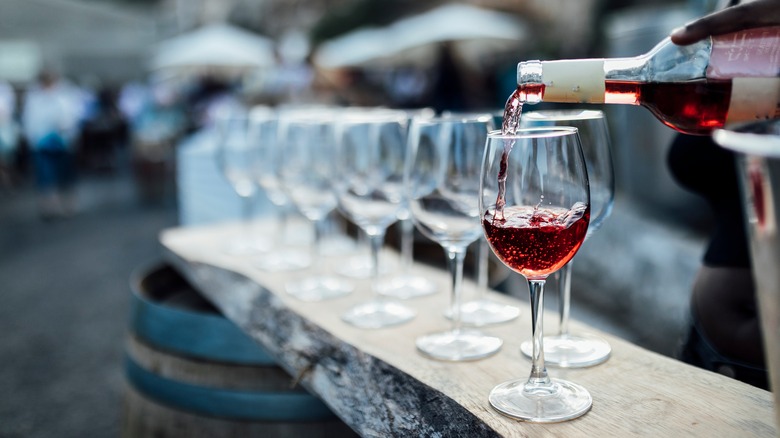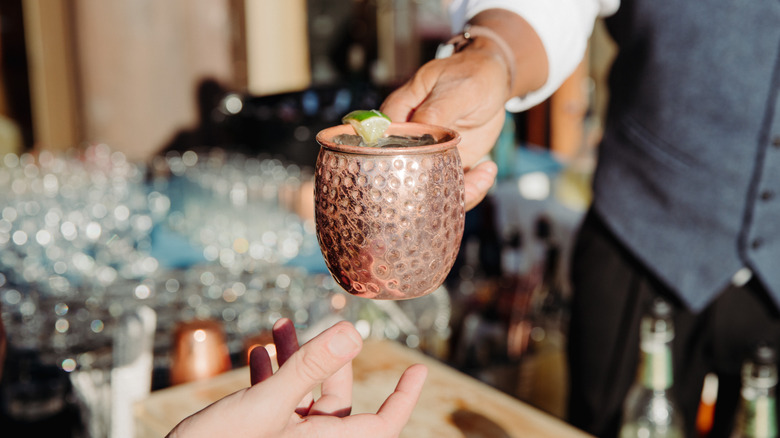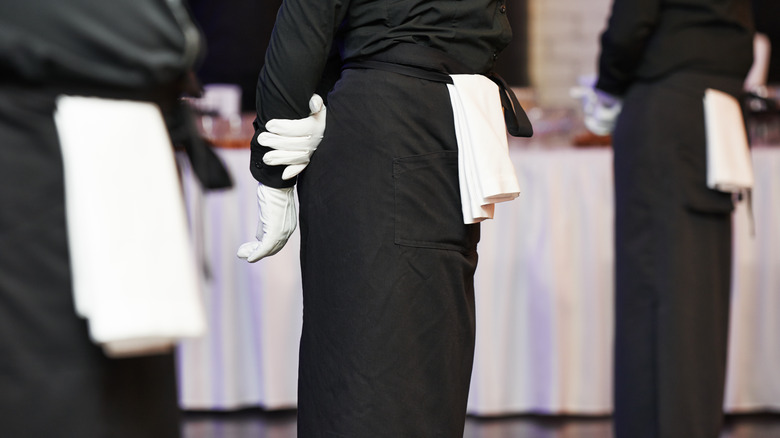Why Every Big Wedding Needs A Secondary Bar Station
At any wedding, celebrating love with your friends and family is the main event — but it comes after a long parade of renting or buying an expensive outfit, figuring out a gift, and traveling (perhaps out of state or country) to the venue. When the day finally arrives, all the work is done, and your loved ones are (at long last) hitched, that open bar is looking good.
David Mawhinney is a chef at Haven's Kitchen, a catering company and event space based in NYC, so he knows a thing or two about what it takes to make a big wedding go off without a hitch. As Mawhinney told Bon Appétit, getting drinks into guests' hands as quickly as possible isn't just an impressive service move — it's also essential for preventing a room full of too-drunk too-quickly wedding-goers. Because Aunt Edna didn't want to stand in that ungodly-long line for another whiskey neat, she ordered a double to save herself a trip. Now, she's talking to (shouting at) the Best Man all about your nickname in high school, and her mouth is about four inches from his face.
To avoid situations like this and worse, Mawhinney says to be proactive by getting a second bar station at your wedding.
A second bar station makes all the difference for you, your guests, and your event staff
Unlike springing for ritzy bottle service at a cocktail bar, proactively setting up a second bar station at your big wedding isn't a luxury but a necessity. Intentionally under-staffing your bar and expecting two bartenders to do the work of four isn't just irresponsible, it makes you a bad host and employer. Setting up a second bar (ideally at opposite ends of the venue) avoids snaking lines across the dance floor and thirsty guests. As a rule, you'll need one bar with two bartenders for every 100 guests. Allowing the bar staff to relax a little also means they will be cranking out better-quality drinks. So, take care of your event staff so your event staff can take care of you.
To that end, instead of setting out a tip jar (or, in addition to it), set aside some cash to thank your bartenders for a job well done at the end of the night — $100 per bartender or more is appropriate for large events.
Financing a second bar station on a dime
Weddings are the amalgamation of a lot of moving parts: invitations, photographers, florists, caterers, and reminding the DJ to please avoid playing "Mr. Brightside" at all costs, even if somebody requests it. Luckily, if you're going to need a second bar station, there are a few money-saving strategies for making it happen without blowing your entire wedding budget on booze.
Instead of buying a liquor package from the venue (which is regularly subjected to markups of 40% or higher), buy your spirits from a wholesale warehouse or from a liquor store that will allow you to return unopened bottles the next day. And you don't have to serve liquor all night, either. It's a classy and cost-effective move to have an open bar during cocktail hour, then switch to serving just wine and beer throughout the rest of the night. To be clear, there's nothing in the rule book that says you have to serve alcohol at your wedding at all. But, if you're going to do it, save yourself (and everyone else) the headache and make sure to do it right.


